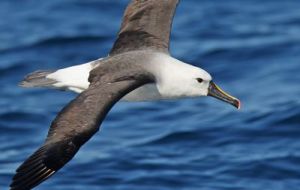MercoPress. South Atlantic News Agency
Canada hosts first world conference on survival of threatened seabirds
 A magnificent albatross skimming the southern seas
A magnificent albatross skimming the southern seas Concern for the survival of albatrosses, penguins, and other marine birds gathered scientists from 40 countries to the first World Seabird Conference in Victoria, western Canada. The five-day event was sponsored by 26 professional seabird groups and societies from around the world.
“We hope to close the meeting having agreed to a new international governing body to address and collaborate on seabird monitoring and conservation” said Professor John Croxall, chairman of BirdLife International’s Global Seabird Program, a conference co-sponsor.
More than 800 participants, including most of the world’s seabird scientists gathered at the Victoria Conference Centre to explore ways to help seabirds survive and enjoy a film festival and seabird art exhibition.
Dying at a rate of around one every five minutes, albatrosses are becoming threatened faster than any other family of birds, according to BirdLife, a global partnership of conservation organizations based in Cambridge, England.
Eighteen of the 22 species of albatross are globally threatened with extinction, an increase from just seven species in 1994. By far the greatest threat faced by albatrosses is death on hooks set by industrial-scale longline fishing vessels.
Every year longliners set about three billion hooks, killing an estimated 300,000 seabirds every year, of which 100,000 are albatrosses. BirdLife warns, “Albatrosses are being killed in such vast numbers that they cannot breed fast enough to keep up, putting them in real danger of extinction.”
Delegates heard a taped message from His Royal Highness The Prince of Wales who said, “As some of you may know, the plight of seabirds has long been close to my heart,” he said in the taped message. “They are, without doubt, some of the world’s most charismatic and iconic species.”
But seabirds are facing the impact of oil spills as well as pollution, destructive fishing practices and climate change. Island breeding species are suffering from the impact of invasive species.
Prince Charles urged action in view of the fact that 97 of the world’s 346 species of seabird are now in danger of extinction. “That they face such challenges to their continued survival is, frankly, terrifying,” he said.
To promote the mitigation measures BirdLife International and the Royal Society for the Protection of Birds in 2006 formed the Albatross Task Force – the world first team of dedicated instructors to demonstrate the correct use of mitigation measures to fishermen, and to develop and test new measures.
Teams were initially established in countries with the highest conservation priority in terms of seabird by-catch and those countries which had solid BirdLife links and support structures in place. The initial teams were established in South Africa and Brazil.
This approach has had success. In South Africa four years after the task force began its work with fishermen, for every 100 seabirds previously killed in fisheries, 85 birds now are being saved.
The Albatross Task Force is now active in seven countries and plans to extend this success across the Southern Hemisphere and beyond.
The prince highlighted the work of the Albatross Task Force, saying, “It is of enormous importance to disseminate more widely the knowledge that there are very simple techniques which could make the most profound difference to seabirds.”
Delegates at the conference will learn how BirdLife has used its practical experience of working with fishermen to develop fact sheets detailing simple and inexpensive measures that can reduce accidental seabird deaths.
An intergovernmental conservation agreement was established in 2004 to address the survival needs of the world’s albatrosses and larger petrels.
The Agreement on the Conservation of Albatrosses and Petrels has a grants scheme that invests funds in determining by-catch levels in priority fisheries and in developing promising approaches to by-catch mitigation. A paper, “”Working together to tackle bycatch,” describing the effort will be presented at the seabird conference.
Challenges in both domestic and high seas fisheries include obtaining enough information on by-catch rates and gaining support for implementation of by-catch mitigation measures.
The information gathered as a result of these grants has been used by Parties to the Agreement in their efforts to reduce by-catch and to develop specific plans of action in their Exclusive Economic Zones. Parties now include: Argentina, Australia, Brazil, Chile, France, Ecuador, New Zealand, Norway, Peru, South Africa, Spain, the United Kingdom and Uruguay.




Top Comments
Disclaimer & comment rulesCommenting for this story is now closed.
If you have a Facebook account, become a fan and comment on our Facebook Page!